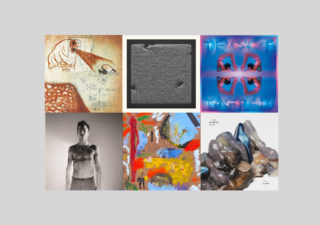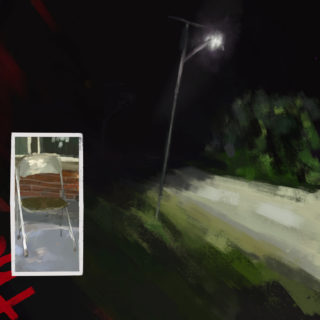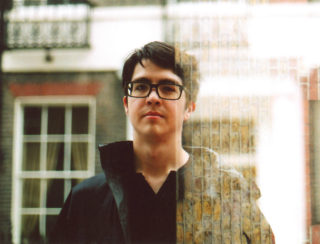
Car Seat Headrest are stuck in traffic. In an eight-seater van, beleaguered by the finest congestion the city has to offer, the band’s journey to the BBC Radio 6 Music studios takes over an hour. They’re coming from the Matador Records office in Wandsworth, south London, which boasts a hostel-like apartment for their touring bands, complete with laminated list of house rules (sample: “We’re here to sell your records, not do your dishes”). Even after traveling to London from last night’s Brighton show, it’s a long drive for a band with everything to think about, and the Seattle quartet is too exhausted to sleep.
Stoic bassist Seth calls shotgun, but keeps pretty quiet for the ride – although he does look at me apologetically when Luke (tour manager, sound man and driver) breaks the silence to ask how I plan to vote in the referendum. With hair like a young Paul Westerberg, the band’s guitarist Ethan sports a white t-shirt with “mentally ill” scribbled across it in Sharpie. He sound-checks his guitar later with The Replacements’ frenetic ‘Tommy Gets His Tonsils Out’ and Neil Young’s fried ‘On the Beach’. The bipolar song choices seem appropriate.
Drummer Andrew, who was attempting to catch a quick nap in the apartment before Ethan screamed “Time for school!” at him in a Marge Simpson voice, is quickly distracted by a pack of cards, shuffling them masterfully before challenging the band’s figurehead, focal point and songwriter, Will Toledo, to a game of gin rummy.
“Dude,” Andrew says to me halfway through the game, “this guy always cheats. You should tell the world that in your article – Will is a filthy cheater at card games.”
Toledo looks mock affronted. “Yeah… Card Cheat Headrest,” he smirks to no one in particular, before returning to the game. Which he wins.
“We haven’t had good luck in the UK,” Toledo warns me earlier in a cafe down the road from the Matador Records office. “Last time we played here my guitar string broke after one song and I decided not to play guitar for the rest of the set, and then the power went off during one song. It just descended into madness.” He’s not alone in thinking this – at some point in the day, everyone in the band tells me they feel like London is “cursed” for them.
Our sit down interview is just a small part of a characteristically busy 24 hours for the band, in the middle of an uninterrupted ten-day run of shows on their longest tour to date. After loading into the 6 Music studios to record a session for Steve Lamacq, the band immediately load back out and drive across the street to the 100 Club for a sold out show. Then on to Manchester the next day. “We’re all pretty wiped out at the moment,” Toledo admits.
Then again, all this activity is the price a band pays when they release what might be the year’s best indie rock album. ‘Teens of Denial’ is Toledo’s twelfth under the Car Seat Headrest banner, but the first to be recorded in a proper studio, with Beat Happening producer Steve Fisk. It’s also the first record Toledo has made with the live band, who have only been playing together for six months. Still, the difference is immediately felt. ‘Teens of Denial’ is a seventy-minute tour de force, the album opens with a blunt declaration of interchangeable post-teen angst – “I’m so sick of…fill in the blank” – and careers through all manner of self-reflection and self-hatred.
Unlike almost every Car Seat album that’s preceded it, this record doesn’t feature Will calling himself out by name. “I think I just loathed myself while I was writing ‘Teens of Denial’,” he explains, “too much to feel comfortable saying my own name. It was supposed to be a very self-disintegrating sort of record – I’m really getting down to the roots of myself, in that sort of pre-name stuff in a way.”
‘Teens of Denial’ hits its peak on ‘The Ballad of Costa Concordia’, an extended 12-minute metaphor, which likens the singer’s control of his own life to the wrecked Italian cruise-ship, while nodding unexpectedly to controversial ‘trans-racial’ activist Rachel Dolezal.
“She said: ‘My life is one of survival and the decisions that I’ve made are based on surviving,’” Toledo tells Steve Lamacq halfway through his 6music interview. “I think that’s the mentality that a lot of people have had, especially my generation – just going day to day and surviving. The question of morality just kind of drops out of it.”
It’s the keen survival instinct that really cuts through the album, and what makes it a relentlessly affirming listen, despite its bleak subject matter. The development of Toledo’s self-lacerating lyrics have resonated with his existing fanbase of adolescent Bandcamp-acolytes, but the musical nods to Jonathan Richman (on the exceptionally-titled ‘(Joe Gets Kicked Out of School for Using) Drugs With Friends (But Says This Isn’t a Problem)’), Guided By Voices and Pavement are what’s caught the ear of the press, who have been quick to label him as “the saviour of indie rock” and “indie rock’s newest hero.”
The plaudits don’t sit well with the twenty-three year old.
“I’ve never felt less fond of indie rock in my life,” he says, only half-joking. “I’ve always considered myself to be making something larger than that. When people say these things, they mean to be nice, but I feel like they’re just pigeonholing the music in this one category. If you want to move beyond that – and I would definitely want to do that – I feel like I can’t accept what people are saying about me. In my own head, I have to be working on the level that I want to work on: what I want to achieve versus what I might have already achieved, which I care less about.”
The attention has also meant that even his Tumblr page, where he posts assorted recordings and musings as anyone with a Tumblr does, is under scrutiny – something Will learned the hard way after uploading a cover of Radiohead’s ‘Pyramid Song’, which swiftly got picked up by a number of music websites. “I’m used to just putting stuff up and having 30 people see it,” he says. “I knew that the exposure was wider now, but I was hoping that you could keep circles to themselves, but that didn’t happen. I put it up, and I thought it was good enough to put it up in the first place, but…y’know, I didn’t intend it to be the next single. So, plenty of people heard it that I didn’t necessarily want to hear it. I just have to be more conscientious, but I hope not to let it bring me down, and that if I want to share something, I’ll still share it.”
Not long before our interview, however, his Tumblr featured a repost from They Might Be Giants, in which the veteran band say they’ve been listening to Car Seat Headrest. Will’s online response: “Wait a minute. Wait a minute. Wait… a minute…” The two Johns have long been an influence on Toledo’s music, though it’s one that he’s unsurprised people haven’t picked up on.
“As far as my ‘studies’ go in musicality,” he tells me. “They Might Be Giants were a very helpful teacher. I really had to boost my listening skills, just to figure out what they were doing. Because they’d have relatively simple-sounding rock songs that had all these weird chords in it, and weird structures, and just interesting arrangements of songs. I think that rubbed off on me. When I was revisiting them just in the past week or so, it was impressive that they were the one band I was really into in high school that I haven’t lost any respect for.” (Toledo’s ‘Pyramid Song’ cover received over 38,000 plays on Tumblr. By comparison, his teenage band’s cover of ‘Ana Ng’ has yet to break 500. Go figure.)
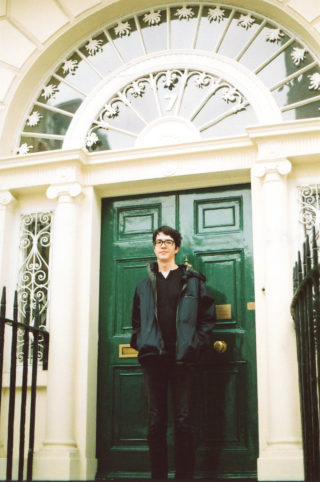
Another of the less-desirable reasons for the press surrounding ‘Teens of Denial’ has been the controversy around ‘(Not) Just What I Needed’, which once included an approved interpolation of a Cars song. Days before the album’s release, the Cars’ Rik Ocasek changed his mind, and all copies had to be destroyed. It cost Matador $50,000. “Vinyl’s a scarcity, so to see it just get sent to a landfill is depressing,” Toledo sighs. “Really, they should have recycled all of it.”
The band managed to rework the song with just 48 hours to spare before its digital release last month, but Toledo is still smarting. “I’ve just gotten fed up with this whole thing, especially while we’re on tour. I kept finding out more and more. I found out we can’t perform it live, because you’re technically supposed to do royalties to the artist when you cover a song. If we played the Cars bit live, and someone filmed it on YouTube, then they could bust us, apparently. So at that point, I was just like ‘Goodbye that song, I’m not going to think about you anymore.’”
Car Seat Headrest’s discography is littered with references to other media. Toledo is the only songwriter I can think of who can go from referencing the myth of Echo to a one-off character from an episode of cult kids cartoon Hey Arnold (“Stoop Kid”) in a single bound. “In every other form of media,” he tells me, by way of justification, “whenever something comes out within a culture, there’s usually cultural references within it. There never seemed to me to be a reason why music couldn’t do that as well – it’s culturally embedded, so a musician should feel free to reference his own culture in the music.”
Fortunately for him, Matador remain supportive of Will to write the way he always has. “For the next thing that we release, I’ll definitely present them with all the samples that need to get cleared and try to pave the way for that to happen as soon as possible. It’s still important to me to make music that way. I don’t want to be bogged down by all that legality of it. Kanye West certainly isn’t – ‘The Life of Pablo’ has so many samples on it, and it’s an awesome record, and I think that’s the type of music that people should be making nowadays. It’s just in touch with what art is – it doesn’t get created in a vacuum.”
As with any budding four-track musician, his initial forays into home recording were based almost entirely on the bands he loved, though his knowledge of their histories were patchy, thanks to his family’s censorship of the music biographies which littered his house. “There’s some of my books on my shelf back in Virginia that still have this white-out tape over a bunch of words, and over John Lennon’s penis,” he tells me, referring to the front cover of the ‘Two Virgins’ album. “There was one book where all the swear words were censored by my sister, and I went through and scratched them out after years of wondering what that long word was – turned out to be ‘sexual revolution’.”
Unlike most young music fans, Toledo would shun going to see the bands he loved play live. “I think just because most people come into guitar music making the music live, with a band,” he says. “I just heard these records and I started recording on my own approximations of this guitar music, but there are just a lot of idiosyncrasies because of the way I was developing my music on the computer, and one of those was that there was a lot more stuff that felt a little more like hip hop with loops and samples and stuff.”
Toledo cites Nirvana’s ‘With the Lights Out’ box set and Of Montreal’s ‘The Early Four Track Recordings’ – and Microsoft Sound Recorder – as the formative influences on his desire to self-record. His parents, meanwhile, were supportive in that way that only parents could be. “As long as I had money coming in some way or another, I think they were OK with it. They put aside money for college, so I had that sort of buffer time – I was just majoring in English, so there wasn’t much going on there…” he trails off, grinning.
Studying English and Religion at William And Mary, the second oldest college in America after Harvard, gave him time to develop his material, and his studies seemed to play a hand in the way his writing evolved. “It was the methods of talking about [literature] that wore me out.” he says. “Just having to listen to the other students spin their stupid theories, and professors just taking it because they want a class discussion to happen. After a certain point, I didn’t even want to come to class because I just wanted to experience the book as I read it, and not as these people see it.
“I was writing lyrics to serve a larger purpose,” Toledo goes on, explaining his fondness for writing tracks that sometimes stretch past the fifteen-minute mark. “That came from reading these poems that are hundreds of years old, and still retain a sense of emotional urgency or importance to it… I always kinda liked longer songs. I found this fake tracklist that I wrote when I was in elementary school, just for this imaginary album I’d written – there were three songs on it that were over ten minutes.”
He claims that there was no initial game plan for the Car Seat Headrest project, though once he garnered a response to his early material, it made him rethink. “My grand idea was to have no persona attached to it, but just put out as much as I could and build this massive catalogue, and gradually gain attention that way. But you know, as soon as people started paying attention to it, it became harder to not have a personality attached to it. I didn’t put up the lyrics to the first four albums because it was mostly gibberish – I was just experimenting with sound more than anything. But I found that the lyrics I actually put thought into were the ones that ended up being the songs I liked more, so I just started focussing on that.
“I like seeing directors and artists as they develop,” he says when I ask him whether there was ever a consideration of pulling the albums from his Bandcamp once he signed to Matador. “I wanted to make it clear that it didn’t come from nowhere, and it came from a place that a lot of people do come from. It’s not impossible to get to here from there. I was lucky in that I can kind of have it both ways, because a lot of people will just see ‘Teens of Denial’ as coming out of nowhere. And if that’s the kind of person they are – if they’re just interested in the now, and what’s hot now – they can be interested in that, and they can think that I came out of nowhere. And for people who are more interested in chasing those narratives of artistry, that Bandcamp is there. And it will stay there.”
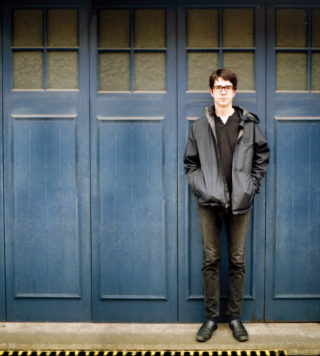
Car Seat Headrest’s real turning point is arguably its sixth album, 2011’s ‘Twin Fantasy’. There, the longer songs rub up against some uncomfortable confessionals (‘Beach Life-in-Death’ sees Toledo scream “I DON’T WANT TO HAVE SCHIZOPHRENIA!”), and some naked hero worship. “God,” he pleads on the swaggering ‘Cute Thing’, “give me Dan Bejar’s voice and John Entwistle’s stage presence.” It was also the album on which Toledo really began indulging his unconscious, incorporating some of the more fucked-up elements of his dreaming life into his lyrics, as well as his waking one.
“I think I do it because I’m not really that inventive of a guy,” he explains. “People say it’s really boring to talk about dreams, but usually I would rather hear about people’s dreams than what they’re actually doing in real life. It reveals about what you worry about, what you think about, and what is important to you. Even just the way that people talk about dreams reveals a lot about how they perceive the world – what they emphasise, or how the narrative works, or if the narrative is just action. Compared to the dullness of reality, it’s kind of a wellspring to draw from.”
He is, however, quick to explain that there are some elements of his brain that he has to keep off the page. “There’s definitely aspects of the dreams I don’t want to talk about. The song I’m working on right now is about sex dreams with people that I would not want to be having sex dreams about. But the task of writing about something and conveying the idea of it, without exposing the parts of it that you don’t want to expose, that’s kind of a fun challenge. John Lennon said ‘Norwegian Wood’ was a song about having an affair, which he was trying to write about without his wife knowing. I like that, I like hiding a narrative in a work in a way that is both obvious, but not obvious unless you know what you’re looking for.”
One striking line amongst many on ‘Twin Fantasy’ is the blunt declaration midway through ‘Nervous Young Inhumans’ – “This is the part of the song where Will starts to regret writing it.” I ask how often this regret creeps into his process, and he laughs.
“That regret was more about the feeling of putting something out there that is exposing myself more than I want to. When I first started getting into making personal music, I tended towards the extreme side of things, but it wasn’t satisfying to me – it ended up being more embarrassing than anything. So I did start trying to develop the John Lennon technique of revealing exactly as much as you want to. And I think that’s a more rewarding way to approach it artistically, because it allows for more ambiguity of meaning than if you’re just sort of laying everything down, [of Montreal frontman] Kevin Barnes style, and saying exactly what you mean to say.
“I was just thinking about Kevin Barnes earlier,” he says. “I feel like he needs to get over this particular phase of his career. He’s got a lot of albums, and there are several great ones that sound very different, and that’s the way he has to work. But I try and avoid that. I don’t want to put something out there that’s just a steppingstone to something else. I want everything to be considered in its own right.”
The journey towards what became ‘Teens of Denial’ began in 2014, as a reaction to the response he received to his 2013 double album ‘Nervous Young Man’. “I think people just had a hard time listening to it because it was so long,” he says. “On a personal level, I kind of disliked it because a lot of the songs were more interested in songcraft than emotional engagement. I felt like I couldn’t engage with it as soon as the album was done. I struggle to make every song a deep reflection of myself and something I can connect to intimately. But that took a long time to come into shape, even though I know what I wanted to do. Usually knowing what you want to do does take longer to come into shape because you have to reject more material.”
This rejected material eventually found a home on ‘How to Leave Town’. Released in 2014, it’s the last of his Bandcamp albums, and possibly the best thing released under the Car Seat Headrest banner. Tracks like ‘The Ending of Dramamine’ and ‘Kimochi Warui (When? When? When? When? When? When? When?)’ are burbling, synth-led anthems of defeat, without a guitar in sight, while blown-out closer ‘Hey, Space Cadet! (Beast Monster Thing in Space)’ was originally intended for ‘Teens of Denial’.
What was planned as “a grab bag of stuff,” turned into very much its own thing – an hour-long EP, which Toledo has previously compared to Sufjan Stevens’ ‘All Delighted People’. “That’s honestly still my favourite Sufjan release,” he admits, somewhat defensively. “I called it an EP at the time just because of the way that it was formed, but I definitely consider it one of my favourite releases that I’ve done.”
He’s also looking to ‘How to Leave Town’ as more of a template for the next Car Seat Headrest album, which is tentatively due out next year. “I’d like to go back to self-producing for the next one,” he says. “I feel like I sort of… the scales fell from my eyes when I was working on ‘Teens of Denial’, and a lot of the lo-fi stuff I was working on just sounded like unnecessary trappings after that. But I would also like to work with other people in the future – I just wanna do as much as I can alone, but not shut other people out.”
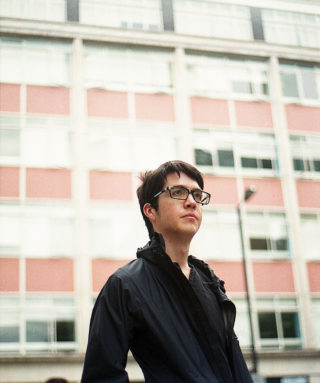
There’s a collection of old men with battered record bags waiting outside the 6 Music studios, though they don’t seem to be there for Car Seat Headrest. As the engineer unironically invites the band to “lay down some tracks” in the studio – an exposed-brickwork corridor within the station’s office – the session seems to go smoothly. Lamacq, ever-avuncular, manages to make the frazzled four-piece relatively relaxed in the sterile surroundings of the studio. Pro that he is, he even uses a question about their imminent Glastonbury performance (Ethan: “I’ve heard it’s a big deal, and it’s muddy.”) to segue into ‘Destroyed by Hippie Powers’.
Half an hour after the session finishes, the band are across the road, crammed into the 100 Club dressing room. “Oh boy, I’m tired,” Andrew mutters, still sweaty from the BBC performance. “This is not going to be fun.” It isn’t long before he’s trying to engage his bandmates in a discussion about Pixar movies. Andrew contentiously insists that the only good Toy Story movie was the first one, which somehow doesn’t get him kicked out of the band altogether. Despite the rodents scurrying around the floor, Ratatouille somehow doesn’t get a mention.
Will, meanwhile, lies down on the sofa, staring at the framed photos and graffiti on the walls. The 100 Club seems to be a museum to itself, and it doesn’t sit well with him. “I’m much more concerned with knowing what bands I like have been at venues we’ve been playing recently,” he muses, before cracking a smile. “Fuck history.”
The stakes are high for tonight’s show. In addition to tickets being sold out, Matador bigwigs – including label founder Chris Lombardi – have flown in from New York. The fans waiting outside skew decidedly younger than those standing around near 6 Music.
“Shall we do a curveball set tonight?” Andrew asks the band as soundcheck begins, before inevitable gremlins threaten to curse the evening’s performance through the PA in a way that trounces any set list self-sabotage. Everything’s feeding back in ways it shouldn’t, and the promoter’s pat insistence that it will sound better when there are people in the room hardly helps matters.
In the midst of the technical turmoil, it’s time for Will to check his mic. Stood still in the centre of the stage, he strums a single note and begins singing Leonard Cohen’s ‘Bird on the Wire’. For four minutes, the band fall silent, as Toledo channels his world-weariness (literally – tour fatigue is a bitch) into one of the most devastating performances of any song I’ve ever witnessed, malfunctioning microphones notwithstanding. The bubble bursts somewhat when the PA levels change, and he has to sing again. Adopting the same pose, he strums a dramatic minor chord, and leans into the microphone with a dark tone of voice: “Leonard Cohen, Leonard Cohen, Leonard Co…” He starts laughing, hard enough to effectively call time on sound check. It’ll have to do.
A few hours later, Car Seat Headrest are back onstage, their arrival soundtracked by Cohen’s ‘I’m Your Man’. The drummer’s threats of a curveball set were greatly exaggerated. The band tear through what you could almost call a greatest hits show. Opening with an assortment of ‘Teens of Denial’’s most brutal moments, there’s still space for a tortured ‘Cute Thing’ and a dragged-out version of ‘Something Soon’ (introduced as “the hit”) which finds space for some perfect three-part harmonies that belie the band’s collective tiredness. They encore with ‘Bodys’ – another ‘Twin Fantasy’ cut, which Andrew tells the audience they’re playing because “You look like a dancing crowd.” It may be the closest thing Car Seat Headrest have to a disco moment, but its refrain – “Don’t you realize our bodies could fall apart at any second?” – isn’t exactly the kind of call-to-dance you’d get from most other lyricists.
But it’s a triumphant ‘Costa Concordia’ that really stops pulses. As the track draws to a close, Seth and Andrew swiftly leave the stage, and through the noise Will begins to sing. “Like a bird…on the wire…” Once again, it’s met with four minutes of reverential silence, while the young man onstage slowly fends his way through the song, with almost as much gravity as Cohen has when he sings it now.
The show is an unquestionable triumph – Andrew pointedly says that the curse has been lifted – but there’s one person who isn’t so sure. “I mean, it was OK,” Will says, standing near the merch stand after the set. “My throat’s been killing me all day, and I wasn’t happy with the Leonard Cohen song. It wasn’t as good as in soundcheck.”
Before I can ask him why, a rep from Matador comes over with a box full of CD copies of ‘Teens of Denial’. No one in Car Seat Headrest has yet seen a finished copy of the album – at least, not since they watched 10,000 other copies get destroyed to satisfy the whims of a new wave frontman. Toledo’s eyes light up as he holds the result of two years’ work, despair and legal wranglings in his hand for the first time.
It’s the happiest he’s been all day.




